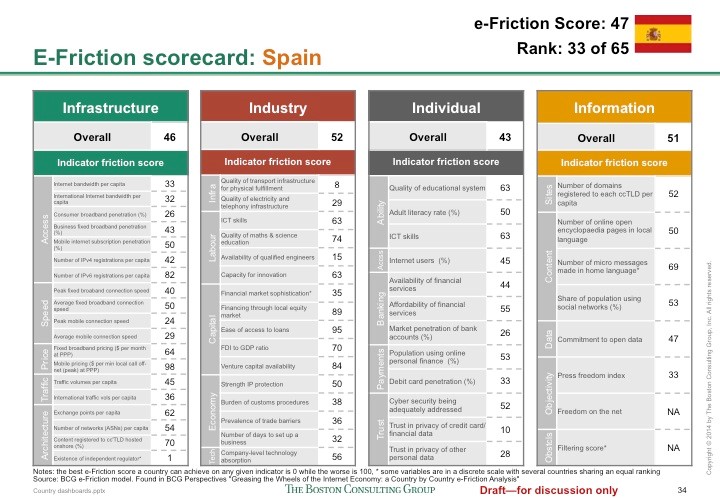ICANN, BCG e-friction workshops in Italy and Spain – lessons learnt
"From social studies we learn that uncertainty creates friction, the same happens to our economies"
(Narcis Serra, president of IBEI)
What is keeping Spain and Italy from fully exploiting the potential of the Internet economy? At a time when both countries are striving to re-ignite their economic engines, the Internet could be the key to a growth and jobs revival – but how do we get there?
Around this key question ICANN and the Boston Consulting Group (BCG) co-moderated two roundtables in Italy and Spain, with the "Italian Agency for the Digital Agenda" in Rome in February, and in Barcelona by the Barcelona School of International Studies (IBEI) at the Pompeu Fabra campus in Barcelona in March. The multistakeholder roundtable meetings aimed to discuss and identify policy recommendations on 'which wheels to grease' to help boost their Internet economy. Both meetings were held under the Chatham house rules.
Starting with Italy and Spain, two countries with similar rankings, at 49 and 47 respectively, of the global e-Friction index, the findings that emerged were revealing of both the challenges faced and the potential opportunities ahead.
A new ecosystem and discourse for developing a digital economy
The Infrastructure alibi
For a while now, much of the attention has been based on the singular assumption that to get more people online and foster digital economic growth, better infrastructure is needed. This is certainly true - but not enough on its own to create a frictionless digital economic environment.
A closer look at the four pillars of the e-Friction Index (infrastructure, industry, individual, information) revealed how action is needed throughout all the pillars. Intervention in the financial sector, access to venture capital or building trust in online transactions are just a few examples of how Italy and Spain could improve their e-friction score with targeted policies beyond infrastructure investment.
Educate to innovate
Education emerged as a fundamental mid- to long-term goal to boost digital economic growth. Improving literacy both in language and IT skills is key to seize the opportunities of the digital economy, including the creation of more local content to connect to the global community.
SMEs online!
The traditional SME model characteristic of Spain and Italian economies, today needs to evolve and adapt to the opportunities and challenges of the global Internet. Support for company creation, start-up incubators and training for social entrepreneurship were identified as critical policy actions. According to one participant only 6-7% of SMEs in Italy use the Internet for e-commerce, accessing a fragmented market at the European level, which further limits growth potential. Worth noting, all participants in Italy saw intervention at the European level as essential, for the creation of a genuine digital single market.
In Spain, data on domain names registration provided by one of the participants supported the finding of the global e-Friction ranking: with a ratio of 3.7% active registered domains (compared to the Netherlands with a ratio of 50%), and with 70% of Spanish companies without a website, data show how the country definitely has a huge potential for improvement in seizing the Internet economy potential.
A couple of key questions, providing food for thought, were posed during the Spanish workshop but definitely applicable to Italy too: "could public policies through 'through enabling tax and regulatory frameworks help find ways for micro SMEs to engage and encourage growth?" "In a market still largely dominated by a restricted group of large corporations, could collaboration between SMEs and public administration facilitate their growth?"
A governance model for success
In both countries, participants convened on the need for a new governance and organizational approach that reflects the dynamic of the Internet a nimble multistakeholder model that responds to the challenges of the fast paced development of the Internet to foster economic growth.
In Spain discussion among workshop participants highlighted how bureaucracy and size of the public sector created friction in its digital economy. The procurement system, the complexity of public administration structure, in addition to the multilevel government model, all add friction blocks to the digital market. Although there are major regional differences within the country itself, the role of the public sector in responding to the reality of the digital economy needs to go beyond the sole priority of infrastructure investment.
In conclusion:
A pertinent observation was made during the workshops - everybody in history has the impression that they are living in exceptional times, probably this was never more true than today, as the impact of the Internet has made our time in history exceptional.
Participants regretted that the common general narrative in Spain and Italy often focuses on the threats, the lost industries, jobs and challenges with a backward looking attitude towards the Internet, which risks undermining its potential to unleash immense benefits.



